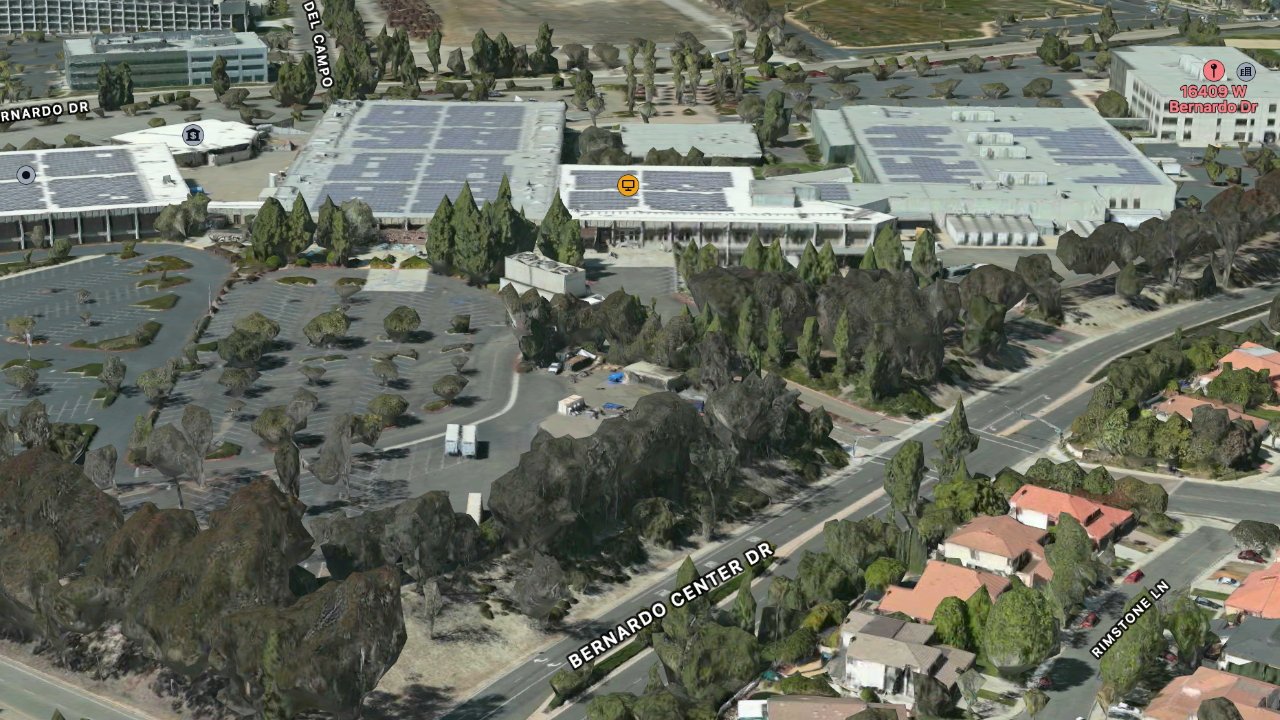Apple buys new campus for $445 million for vast San Diego expansion
Apple has acquired the existing Rancho Vista Corporate Center in San Diego, as part of its continued plan to expand hardware and software engineering in the region.

Apple Maps view of the Rancho Vista Corporate Center
In 2019, Apple committed to adding 1,200 new technology jobs in San Diego by 2022, and saying it hoped to establish a new campus there. Since then, it has reportedly been leasing buildings across University City and Rancho Bernardo, but it has now bought the 67-acre Rancho Vista Corporate Center for $445 million.
According to The San Diego Union-Tribune, this is Apple's first commercial property purchase in the region. The publication also reports that Apple has been building up its employment plans, and now aims to have 5,000 workers locally by 2026.
"We've been part of the community in San Diego for more than two decades," an Apple spokesperson told the publication, "and are thrilled to continue investing here as we expand our world-class teams."
City officials in 2019 had said that Apple planned to recruit staff for both hardware and software jobs. But the presence of Qualcomm in the region prompted rumors that Apple was concentrating its efforts to replace that firm's cellular modem processors.
Now, however, The San Diego Union-Tribune reports that Apple's jobs website includes new openings across software, data science and other non-hardware positions.
Rancho Vista Corporate Center was previously owned by Hewlett Packard. HP sold the campus to the Swift Real Estate firm for $69 million, before then leasing back five of its seven buildings.
Swift Real Estate says it spent $80 million renovating the campus, including the addition of a fitness center, multiple sports courts, and what it describes as a "professionally-managed cafe."
Read on AppleInsider

Apple Maps view of the Rancho Vista Corporate Center
In 2019, Apple committed to adding 1,200 new technology jobs in San Diego by 2022, and saying it hoped to establish a new campus there. Since then, it has reportedly been leasing buildings across University City and Rancho Bernardo, but it has now bought the 67-acre Rancho Vista Corporate Center for $445 million.
According to The San Diego Union-Tribune, this is Apple's first commercial property purchase in the region. The publication also reports that Apple has been building up its employment plans, and now aims to have 5,000 workers locally by 2026.
"We've been part of the community in San Diego for more than two decades," an Apple spokesperson told the publication, "and are thrilled to continue investing here as we expand our world-class teams."
City officials in 2019 had said that Apple planned to recruit staff for both hardware and software jobs. But the presence of Qualcomm in the region prompted rumors that Apple was concentrating its efforts to replace that firm's cellular modem processors.
Now, however, The San Diego Union-Tribune reports that Apple's jobs website includes new openings across software, data science and other non-hardware positions.
Rancho Vista Corporate Center was previously owned by Hewlett Packard. HP sold the campus to the Swift Real Estate firm for $69 million, before then leasing back five of its seven buildings.
Swift Real Estate says it spent $80 million renovating the campus, including the addition of a fitness center, multiple sports courts, and what it describes as a "professionally-managed cafe."
Read on AppleInsider

Comments
If there is already a large pool of qualified personnel in the area, it makes sense to open operations (or expand them in this case) there.
Huawei kept operations open in Canada to accommodate top scientists it picked up from Nortel. They did the same with imaging scientists (this time from Nokia) in Finland.
Many companies opened a branch in San Diego merely to poach engineers from Qualcomm. Examples include Nokia and Huawei; their R&D centers had one purpose and one purpose only and that was to attract people away from Qualcomm!
Qualcomm writes pretty terrible cellular specs and they are successful at leaving out the most crucial information which is parametric handoff boundaries and thresholds. So without Qualcomm engineering knowledge you really can't build cell phone chipsets.